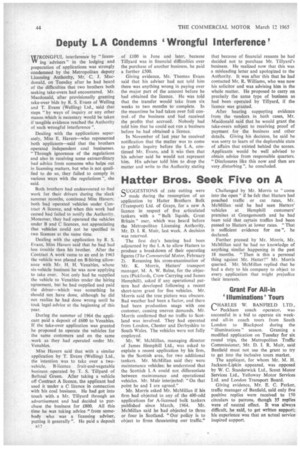Deputy L A Condemns 'Wrongful interference'
Page 46

If you've noticed an error in this article please click here to report it so we can fix it.
%WRONGFUL interference by "licensW ing advisers" in the lodging and preparation of applications was strongly condemned by the Metropolitan deputy Licensing Authority, Mr. C. J. Macdonald, on Tuesday after he bad heard of the difficulties that two brothers both seeking take-overs had encountered. Mr. Macdonald, after provisionally granting take-over bids by R. S. Evans of Welling and T. Evans (Welling) Ltd., said that steps "by ways of inquiry or any other means which is necessary would be taken if tangible evidence reached the Authority of such wrongful interference ".
Dealing with the applications separately, Miss E. Havers—who represented both applicants—said that the brothers operated independent coal businesses. "Through ignorance of the regulations and also in receiving some extraordinary had advice from someone who helps out in licensing matters, but who is not qualified to do so, they failed to comply in various ways with the regulations ", she said.
Both brothers had endeavoured to find work for their drivers during the slack summer months, continued Miss Havers; both had operated vehicles under Contract A licence, and when this work had ceased had failed to notify the Authority. Moreover, they had operated the vehicles under B and C licences, not appreciating that vehicles could not be specified in two licences at the same time.
Dealing with the application by R. S. Evans, Miss Havers said that he had had less trouble than his brother. After the Contract A work came to an end in 1963 the vehicle was placed on B-hiring allowance with Mr. H. II. Venables, whose six-vehicle business he was now applying to take over. Not only had he supplied the vehicle to Venables under the hiring agreement, but he had supplied and paid the driver—which was something he should not have done, although he did not realize he had done wrong until he took legal advice at the beginning of this year, During the summer of 1964 the applicant paid a deposit of £600 to Venables. If the take-over application was granted he proposed to operate the vehicles for the same customers and on the same work as they had operated under Mr, Venables.
Miss Havers said that with a similar application by T. Evans (Welling) Ltd., the intention was to take over a twovehicle, B-licence fruit-and-vegetable business operated by T. S. Tillyard of Bethnal Green. After taking a vehicle off Contract A licence, the applicant had used it under a C licence in connection with his coat business. He had got into touch with. a Mr. Tillyard through an advertisement and had decided to purchase the business for £800. All this time he was taking advice "from somebody who was a licensing adviser, patting it generally ". He paid a deposit of £100 in June and later, because Tillyard was in financial difficulties over the purchase of another business, he paid a further £500.
Giving evidence, Mr. Thomas Evans said that his adviser had not told him there was anything wrong in paying over the major part of the amount before he had obtained the licence. He was told that the transfer would take from six weeks to two months to complete. In the meantime he had taken over full control. of the business and had received the profits that accrued. Nobody had told him that he could not run a business before he had obtained a licence.
In November of last year he received notification that the matter was to come to public inquiry before the L A, continued Mr. Evans, and it was then that his adviser said he would not represent him. His adviser told him to drop the matter and write to the Authority stating that because of financial reasons he had decided not to purchase Mr. Tillyard's business. He realized now that this was a misleading letter and apologized to the Authority. It was after this that he had contacted Mr. R. Williams, who was now his solicitor and was advising him in the whole matter. He proposed to carry on precisely the same type of business as had been operated by Tillyard, if the licence was granted.
After hearing supporting evidence from the vendors in both cases, Mr. Macdonald said that he would grant the take-overs subject to receiving proof of payment for the business and other details. Giving his decision, he said he was sorry to learn of the deplorable state of affairs that existed behind the scenes. Applicants would he well advised to obtain advice from responsible quarters. " Disclosures like this now and then are very ,disturbing", he concluded.
























































































































